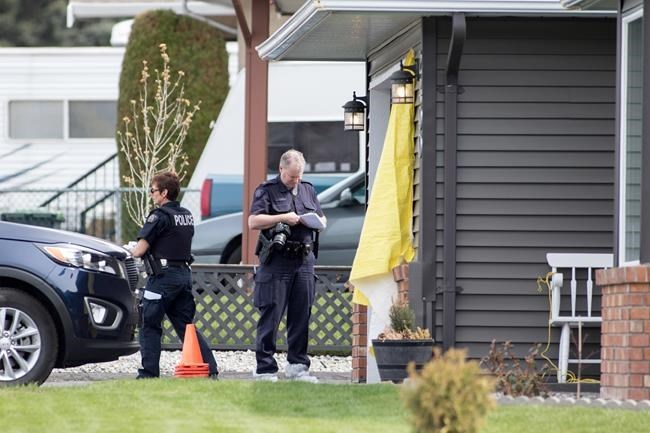KELOWNA, B.C. — A man who pleaded guilty to murdering four people will have to wait 25 years before applying for parole as part of a life sentence to be served concurrently for all the crimes he committed in Penticton, B.C.
B.C. Supreme Court Justice Alison Beames said Thursday that John Brittain's "execution-style" killings in April of last year caused great suffering for the victims' families.
But she said imposing a longer period of parole eligibility would be inappropriate for someone who is 69 and remorseful for his actions.
Brittain will be 92 by the time he can apply for parole, and Beames said that meets the objectives of denunciation, deterrence and retribution.
She said a person who commits four murders and is sentenced to consecutive 25-year parole ineligibility terms would receive, on paper, the same sentence as someone who commits one first-degree murder.
Beames acknowledged the pain of the families, five of whom read victim impact statements in court on Wednesday.
"Although judges cannot, and I do not, make decisions based on sympathy or prejudice, I can assure the victims of these horrific crimes that they have my deepest sympathy for their losses."
Brittain pleaded guilty Wednesday to the second-degree murder of Rudi Winter and the first-degree murders of Barry and Susan Wonch as well as Darlene Knippelberg. Court heard he shot them multiple times within a span of about 35 minutes on April 15, 2019.
He broke down several times at the sentencing hearing earlier Thursday as he apologized to the families, saying he shattered their lives when he decided to shoot their loved ones with a high-powered rifle at close range.
He said he is also sorry for the devastation he caused his former wife, the City of Penticton and its residents, as well as police officers who responded to the carnage he was responsible for.
The court heard Brittain turned himself in to the RCMP immediately after shooting Knippelberg, his last target, when she answered the door.
He told police all four neighbours harassed his former wife, who'd complained to him about them for years in connection with multiple issues that also had her filing complaints with the city, which addressed them but not to her satisfaction.
In one case, she said Barry and Susan Wonch were buying, fixing and selling furniture from their home without a business licence, the court heard. She also said smoke from the couple's chimney bothered her, and there were property violations.
Brittain said Katherine Brittain, whom he divorced in 2014, did not know he would use his rifles to shoot her neighbours.
"If she had any idea I would do such a thing, she would have stopped me or called the police," Brittain said. "I, only I, am fully responsible for this."
Parole eligibility for first-degree murder is set at 25 years, while it is between 10 and 25 years for second-degree murder.
Brittain's defence lawyer, Paul McMurray, had asked for a 25-year eligibility period while Crown attorney Colin Forsyth called for a 40-year term, including 15 years for the second-degree-murder charge.
Brittain told the sentencing hearing that he doesn't understand why he resorted to such violence, but that the "catastrophe" came after 20 years of major depression and work-related burnout in his engineering job.
The court heard that some of the officers who responded to the shootings have not been able to return to work.
In his apology to the police, Brittain said: "I'm sure what you saw and had to deal with that day was not what you ever wanted to see or have to deal with when you entered your profession. I see these images in my head, and they will torment me for the rest of my life."
McMurray said his client led a model life as an engineer who worked on water projects in poor, remote communities in Canada and West Africa, but the isolation of that job caused his depression. which he was experiencing in the spring of 2019.
Brittain lacks interpersonal skills and is driven by "fixing things," including what he considered a problem he had to solve when he killed four people, McMurray said, adding his client told police when he turned himself in that "other options were taken off the table."
-- By Camille Bains in Vancouver.
This report by The Canadian Press was first published Oct. 15, 2020.
The Canadian Press



